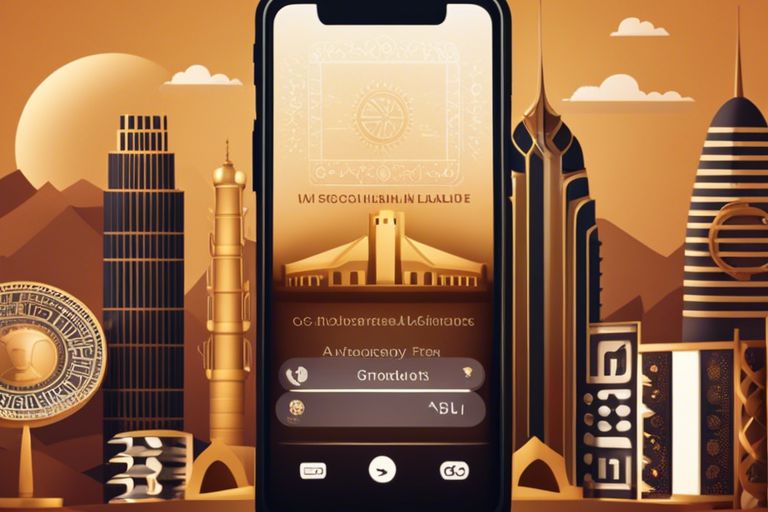Apps leveraging artificial intelligence technology have revolutionized the way African languages are learned and spoken. These innovative applications are not only breaking down language barriers but also preserving and promoting the rich linguistic diversity of Africa. With the power of AI, these apps offer users the opportunity to immerse themselves in African languages through interactive lessons, real-time translation, and pronunciation practice. In this blog post, we will explore some of the top AI-powered apps that are making a significant impact on the accessibility and prominence of African languages in the digital age.

Key Takeaways:
- African languages are gaining support: AI-powered apps are being developed to support African languages, promoting linguistic diversity and inclusivity.
- Improving accessibility: These apps help in breaking down language barriers, making information and technology more accessible to a wider range of people.
- Promoting cultural preservation: By incorporating African languages into AI apps, there is a greater emphasis on preserving and promoting cultural heritage.
- Enhancing communication: AI-powered apps for African languages can facilitate better communication within communities and with the rest of the world.
- Driving innovation: The development of AI technology for African languages fosters innovation in the tech industry and opens up new opportunities for growth.
- Addressing educational needs: These apps can be valuable tools for improving literacy and education in African languages, benefiting both students and teachers.
- Challenges to overcome: Despite the progress, there are still challenges such as dialectal variations and limited resources that need to be addressed for wider adoption of AI-powered apps for African languages.

Development of AI-Powered Language Apps
One African languages hold a wealth of cultural and linguistic diversity, making the development of AI-powered language apps for these languages a crucial step towards inclusivity and accessibility.Key Technologies and Frameworks
Frameworks play a pivotal role in the development of AI-powered language apps for African languages. Technologies such as Natural Language Processing (NLP), Machine Learning, and Deep Learning are crucial components in creating accurate language processing models that can cater to the nuances of various African languages.
Challenges and Opportunities in African Language Processing
Language processing for African languages presents unique challenges and opportunities. The diversity of languages and dialects, limited linguistic resources, and lack of standardized data pose challenges. However, these challenges also create opportunities for innovation and the development of new methods and algorithms to overcome these hurdles.
AIPowered language apps have the potential to bridge the gap between technology and linguistic diversity in Africa. By addressing the challenges and leveraging the opportunities in African language processing, developers can usher in a new era of inclusive technology that caters to the linguistic richness of the continent.
Impact on Education and Communication
Language Learning and Preservation
Learning African languages has been a significant challenge due to the limited availability of resources and qualified teachers. However, with the advent of AI-powered apps, individuals now have access to interactive tools that facilitate language learning in an engaging manner. These apps not only make learning more accessible but also play a crucial role in preserving endangered African languages by providing a platform for their documentation and dissemination.
Enhancing Communication Across Diverse African Communities
Communication within diverse African communities poses a unique set of challenges due to the multitude of languages spoken across the continent. AI-powered apps equipped with translation features are revolutionizing communication by breaking down language barriers and enabling seamless interaction among people from different linguistic backgrounds. This advancement is not only fostering unity but also promoting cultural exchange and understanding.
This technology is bridging the gap between individuals who previously struggled to communicate effectively, opening up opportunities for collaboration, knowledge sharing, and societal advancement. By empowering users to overcome language barriers, AI-powered apps are playing a pivotal role in transforming communication dynamics across various African communities.
Societal and Economic Benefits
All A roadmap to help AI technologies speak African languages is paving the way for AI-powered apps to play a significant role in the development of African languages, offering a plethora of societal and economic benefits.Bridging Language Barriers in Business and Trade
On the economic front, AI-powered apps for African languages are instrumental in bridging language barriers in business and trade. These technologies facilitate effective communication between stakeholders who speak diverse African languages, fostering smoother transactions and collaborations. By enabling seamless linguistic interactions, these apps enhance economic opportunities and open up new markets across the continent.Fostering Inclusive Societal Participation
Barriers to inclusive societal participation are being dismantled by AI-powered apps designed for African languages. These innovative tools break down language barriers, allowing individuals from different linguistic backgrounds to engage meaningfully in various societal spheres. By providing a platform for diverse voices to be heard and understood, these apps promote inclusivity and empower marginalized communities to actively participate in social, political, and economic activities.Participation in crucial societal dialogues, decision-making processes, and educational opportunities is no longer hindered by linguistic diversity, thanks to the advancements in AI language technologies tailored for African languages. These apps are revolutionizing the landscape of societal engagement, ensuring that all individuals have equal access to information and resources, regardless of their native language.
Future of AI and African Languages
Emerging Trends in AI and Language Learning
One of the emerging trends in AI and language learning is the development of personalized learning experiences. AI-powered apps are now able to adapt to the individual needs and learning styles of users, providing targeted feedback and customized lessons to enhance language skills. This tailored approach has shown to improve learning outcomes and engagement in African language learning.
Potential Developments in Natural Language Processing
Future advancements in Natural Language Processing (NLP) hold great promise for African languages. NLP systems are increasingly becoming more accurate and efficient in understanding and generating human language, paving the way for improved translation services, speech recognition, and text analysis in African languages. This progress in NLP technology is crucial for bridging the digital language divide and promoting linguistic diversity.
Language is a powerful tool for communication and cultural preservation. As AI continues to advance, there is great potential for the development of more sophisticated NLP models that can accurately process and understand the nuances of African languages. This will not only enhance language learning experiences but also contribute to the preservation and promotion of African linguistic heritage in the digital age.
Final Words
Summing up, the development of AI-powered apps for African languages marks a significant step towards bridging the digital divide and preserving the rich linguistic diversity of the continent. These apps not only facilitate communication and education in local languages but also hold the potential to drive economic growth and empower communities. As technology continues to advance, it is crucial to invest in the development of more AI-powered tools tailored to African languages to ensure that no language is left behind in the digital age. By harnessing the power of AI, we can create a more inclusive and connected society where all individuals have access to the benefits of technology, regardless of the language they speak.
FAQ
Q: What are AI-powered apps for African languages?
A: AI-powered apps for African languages are applications that leverage artificial intelligence technology to provide language learning, translation, and communication tools specifically tailored to African languages.
Q: How do AI-powered apps benefit users of African languages?
A: AI-powered apps help preserve and promote African languages by making them more accessible through digital platforms. They also facilitate cross-cultural communication and empower users to learn and use their native languages more effectively.
Q: What features are typically found in AI-powered apps for African languages?
A: AI-powered apps for African languages often include features such as speech recognition, translation services, language tutorials, cultural insights, and vocabulary building exercises.
Q: Are AI-powered apps for African languages user-friendly?
A: Yes, many AI-powered apps for African languages are designed to be user-friendly, with intuitive interfaces and interactive tools that make language learning enjoyable and engaging.
Q: How accurate are the translation capabilities of AI-powered apps for African languages?
A: The accuracy of translation capabilities in AI-powered apps for African languages can vary depending on the app and the language pair. However, advancements in AI technology have significantly improved the accuracy of translations in recent years.
Q: Can AI-powered apps help preserve endangered African languages?
A: Yes, AI-powered apps can play a crucial role in preserving endangered African languages by providing a platform for learning, documentation, and revitalization efforts within language communities.
Q: Are there privacy concerns with using AI-powered apps for African languages?
A: While privacy concerns are important to consider with any digital technology, reputable AI-powered app developers prioritize data security and user privacy. It’s important to review the app’s privacy policies and settings before use.
All World Countries listed below.
Afghanistan, Albania, Algeria, Andorra, Angola, Antigua and Barbuda, Argentina, Armenia, Australia, Austria, Azerbaijan, Bahamas, Bahrain, Bangladesh, Barbados, Belarus, Belgium, Belize, Benin, Bhutan, Bolivia, Bosnia and Herzegovina, Botswana, Brazil, Brunei, Bulgaria, Burkina Faso, Burundi, Cabo Verde, Cambodia, Cameroon, Canada, Central African Republic, Chad, Chile, China, Colombia, Comoros, Congo, Costa Rica, Côte d’Ivoire, Croatia, Cuba, Cyprus, Czech Republic, Denmark, Djibouti, Dominica, Dominican Republic, East Timor (Timor-Leste), Ecuador, Egypt, El Salvador, Equatorial Guinea, Eritrea, Estonia, Eswatini, Ethiopia, Fiji, Finland, France, Gabon, Gambia, Georgia, Germany, Ghana, Greece, Grenada, Guatemala, Guinea, Guinea-Bissau, Guyana, Haiti, Honduras, Hungary, Iceland, India, Indonesia, Iran, Iraq, Ireland, Israel, Italy, Jamaica, Japan, Jordan, Kazakhstan, Kenya, Kiribati, Korea, North, Korea, South, Kosovo, Kuwait, Kyrgyzstan, Laos, Latvia, Lebanon, Lesotho, Liberia, Libya, Liechtenstein, Lithuania, Luxembourg, Madagascar, Malawi, Malaysia, Maldives, Mali, Malta, Marshall Islands, Mauritania, Mauritius, Mexico, Micronesia, Moldova, Monaco, Mongolia, Montenegro, Morocco, Mozambique, Myanmar (Burma), Namibia, Nauru, Nepal, Netherlands, New Zealand, Nicaragua, Niger, Nigeria, North Macedonia, Norway, Oman, Pakistan, Palau, Panama, Papua New Guinea, Paraguay, Peru, Philippines, Poland, Portugal, Qatar, Romania, Russia, Rwanda, Saint Kitts and Nevis, Saint Lucia, Saint Vincent and the Grenadines, Samoa, San Marino, Sao Tome and Principe, Saudi Arabia, Senegal, Serbia, Seychelles, Sierra Leone, Singapore, Slovakia, Slovenia, Solomon Islands, Somalia, South Africa, South Sudan, Spain, Sri Lanka, Sudan, Suriname, Sweden, Switzerland, Syria, Taiwan, Tajikistan, Tanzania, Thailand, Togo, Tonga, Trinidad and Tobago, Tunisia, Turkey, Turkmenistan, Tuvalu, Uganda, Ukraine, United Arab Emirates, United Kingdom, United States, Uruguay, Uzbekistan, Vanuatu, Vatican City, Venezuela, Vietnam, Yemen, Zambia, Zimbabwe.